The Part Of Your Refrigerator You Should Never Put Your Eggs
Organization is certainly an important part of making things run smoothly in the kitchen, but if it comes at the cost of the freshness of your ingredients, it's doing more harm than good. You may have heard that storing milk in the door of your refrigerator makes it go bad faster, and the same applies to eggs.
Reader's Digest reports that storing your eggs in the plastic egg tray that comes with your refrigerator is one of the worst ways to store them. The reason has less to do with the container itself, but where it's located — on the side of the door. Remember, just because eggs are contained within a shell doesn't mean they're safe from the elements. The fridge door has the most inconsistent temperature, and anything that sits there, including eggs, is subject to any fluctuations caused by opening or closing. Over time, the eggs will inevitably go bad faster.
Where is the best place in the refrigerator to put eggs?
In order to ensure your eggs last as long as possible, Good Housekeeping recommends storing them in the middle of the fridge. Eggs stay the freshest when kept at a consistently cool temperature, and at grocery stores, they're refrigerated at 68 degrees Fahrenheit or below. The middle shelf of your fridge best resembles these conditions.
It's best to also leave the eggs in the carton rather than transferring them to either a separate container, or the egg compartment built into the fridge. As Good Housekeeping explains, eggshells are porous, so not only are they susceptible to changes in temperature, they can also absorb any surrounding odors. Egg cartons are better at preventing this absorption so you won't ever have to worry about your omelette having an aftertaste of last night's leftovers.
For optimal taste and freshness, your eggs should always go straight from the grocery store to the shelf in the middle of your fridge.

